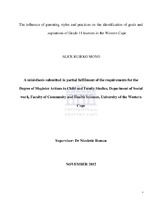| dc.contributor.advisor | Roman, Nicolette | |
| dc.contributor.author | Moyo, Alice Rujeko | |
| dc.date.accessioned | 2015-11-05T12:45:49Z | |
| dc.date.available | 2015-11-05T12:45:49Z | |
| dc.date.issued | 2012 | |
| dc.identifier.uri | http://hdl.handle.net/11394/4641 | |
| dc.description | Magister Artium (Child and Family Studies) - MA(CFS) | en_US |
| dc.description.abstract | Self-Determination Theory is a theory of motivation that aims to explain individuals' goal directed behaviour. Grade 11 learners are naturally in a stage of pursuing certain life goals and aspirations in the process of completing their schooling careers. Often the circumstances or environment provide the opportunities for individuals to be motivated towards aspiring to their life goals. Parents are key role players in either enhancing or hindering the motivation for children to be goal directed. This study examined the association of parenting practices and styles on the identification of goals and aspirations of Grade 11 learners in secondary schools in the Metro South region of the Western Cape. The objectives were to determine: (1) the content of the goals and aspirations of Grade 11 learners, (2) the perceived parental styles and practices of their parents and (3) the relationship between (1) and (2). A quantitative research method with a cross-sectional correlation design was used. The Parental Styles and Dimensions Questionnaire and the Aspiration Index were the instruments for collecting the data. The final sample consisted of 257 participants of which 155 (60.3%) were females. The mean age was 17.3 years. The results suggest that the maternal parenting was more prevalent than paternal parenting. Maternal and paternal authoritative parentings were significantly positively related to both intrinsic and extrinsic goals and aspirations whereas maternal and paternal permissive parentings were significantly positively related to only extrinsic goals. The study showed that the participants are inclined towards intrinsic goal pursuits. Furthermore, maternal parenting was a significant predictor of both intrinsic and extrinsic goals and aspirations and both parents predicted a stronger association. | en_US |
| dc.language.iso | en | en_US |
| dc.publisher | University of the Western Cape | en_US |
| dc.subject | Parenting | en_US |
| dc.subject | Parenting styles | en_US |
| dc.subject | Self-determination theory | en_US |
| dc.subject | Grade 11 | en_US |
| dc.subject | Extrinsic goals and aspirations | en_US |
| dc.title | The influence of parenting styles and practices on the identification of goals and aspirations of Grade 11 learners in the Western Cape | en_US |
| dc.type | Thesis | en_US |
| dc.rights.holder | University of the Western Cape | en_US |

